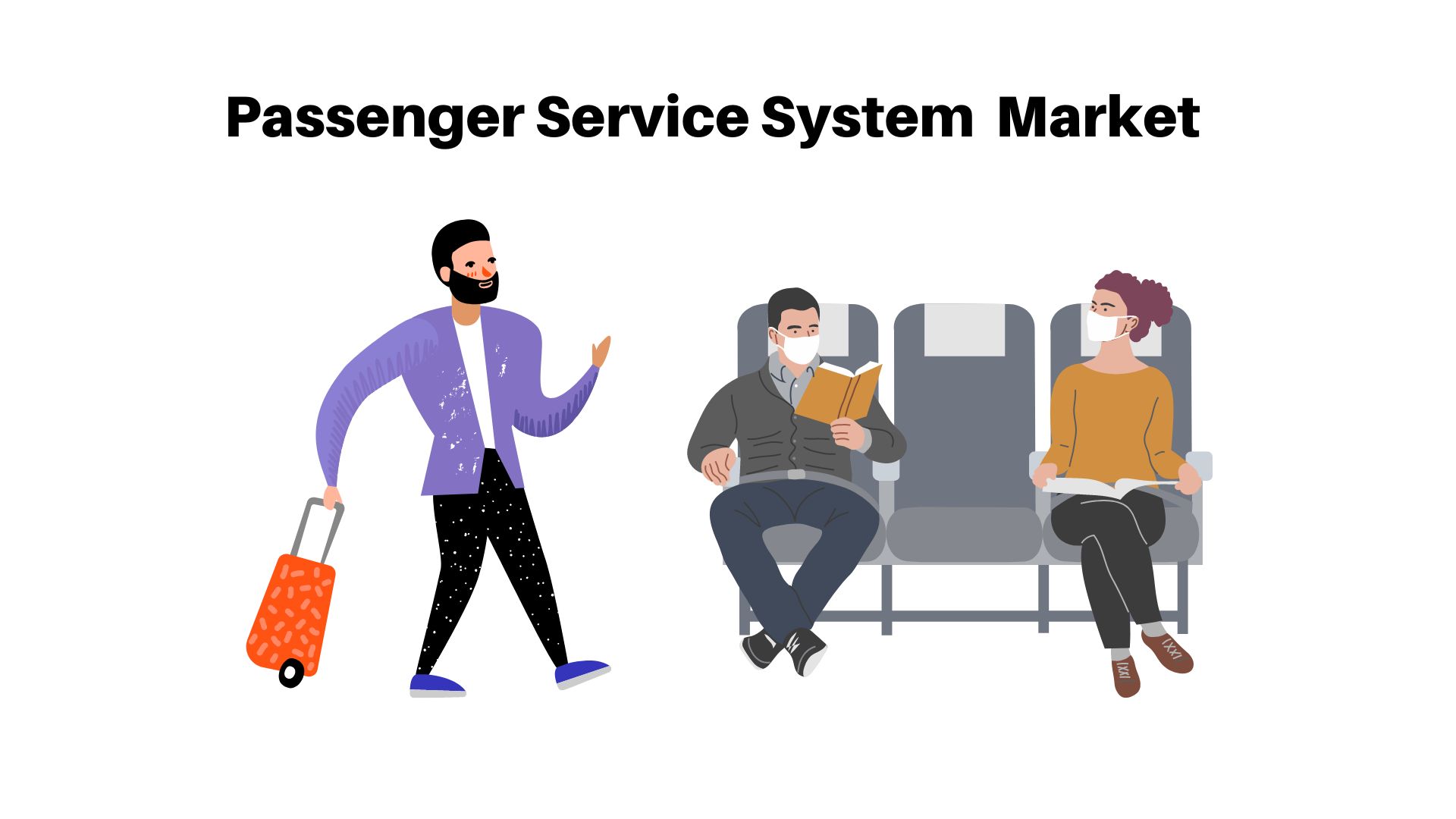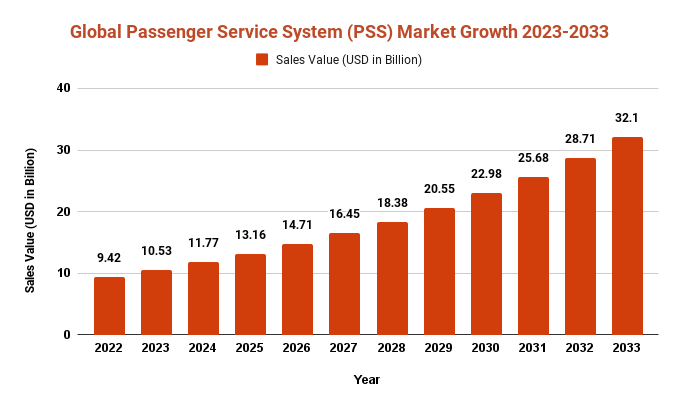Passenger Service System (PSS) Market Set for Rapid Growth, To Reach Around USD 32.1 Bn by 2033

Page Contents
Market Overview
Published Via 11Press: A Passenger Service System (PSS) Market is a piece of software used by airlines to manage all passenger-related activities. It offers an all-inclusive solution, covering everything from reservations and ticketing to check-in and boarding. The primary aim of a PSS is to simplify the passenger journey and give passengers an effortless experience. Furthermore, it helps airlines run operations more efficiently and cost effectively.
The Global Passenger Service System (PSS) Market represented USD 9.42 Bn in 2022 and will anticipate around USD 32.1 Bn by 2033 projected around CAGR of 11.79% amid forecast frame of 2023 to 2033.
Passenger Information System (PSS) facilitates flight booking through various channels like online booking, mobile apps and travel agents. It generates electronic tickets (e-tickets) and manages ticket inventory, while passengers may check-in for their flights either online or at the airport; additionally it manages baggage handling from check-in to delivery at destination; furthermore it controls boarding procedures like seat assignments and boarding passes too. Moreover, PSS administers airline loyalty programs which reward passengers with rewards and benefits; plus it handles ancillary services like inflight meals, baggage allowances, and seat upgrades
Key Takeaways
- A Passenger Services System (PSS) is a software platform used by airlines to manage passenger-related activities, from reservations and ticketing through check-in and boarding.
- A primary objective of a PSS is to offer an efficient passenger journey by streamlining each step.
- The Passenger Service System (PSS) Market expected to reach USD 9.42 Billion in 2022.
- Forecasted compound annual growth rates between 2023 and 2033 is 11.79%.
- By 2033, the Passenger Service System (PSS) Market is projected to reach USD 32.1 Billion.
- A Passenger Service System (PSS) enables passengers to book flights through various channels, such as online booking, mobile apps and travel agents.
- This system produces electronic tickets (e-tickets) and manages ticket inventory.
- Passengers can check-in for their flights either online or at the airport using a Passenger Service System (PSS).
- The system controls the baggage handling process, from check-in to delivery at its final destination.
- The system controls the entire boarding process, from seat assignments to boarding passes.
- A PSS oversees airline loyalty programs and rewards passengers with rewards and other benefits.
- Ancillary services such as in-flight meals , baggage allowances and seat upgrades are managed through a Passenger Services System (PSS).
- Overall, a PSS is an integral element of the airline industry, increasing passenger satisfaction and operational effectiveness.

Get Passenger Service System (PSS) Market Sample Report: https://marketresearch.biz/report/passenger-service-system-pss-market/request-sample/
Regional Snapshot
- North America: PSS is widely adopted in North America, with most airlines adopting it as their core technology for operations. Leading PSS providers in the region include Sabre, Amadeus and Travelport.
- Europe: The PSS market in Europe is highly competitive, featuring major players such as Amadeus, Sabre and Navitaire. Low-cost carriers in particular have been driving adoption of PSS across the region.
- Asia Pacific: The adoption of PSS in the Asia Pacific region has been rapidly rising, with an increasing number of airlines adopting the technology. Key players in this space include Amadeus , Sabre and Travelport.
- Middle East & Africa: Though PSS adoption in the Middle East and Africa region remains low , many airlines still rely on legacy systems. Nonetheless, the market is growing, with leading PSS providers such as Amadeus and Sabre expanding their presence in the region.
- Latin America: PSS adoption in Latin America has seen a steady increase in recent years, with airlines such as Avianca and LATAM adopting the technology. Leading PSS providers include Amadeus and Sabre.
Drivers
- Passenger Experience: Airlines strive to offer a superior passenger experience, and PSS technology plays a pivotal role in this effort. Through PSS, airlines can efficiently manage the passenger journey from booking through arrival, improving travelers' overall journey.
- Operational Efficiency: PSS assists airlines in managing their operations more effectively, cutting costs and increasing productivity. By automating tasks such as check-in , boarding, and baggage handling, PSS can simplify processes while decreasing wait times for passengers.
- Ancillary Revenue: PSS allows airlines to sell ancillary products and services like baggage allowances, in-flight meals, and seat upgrades. This generates additional revenue for them while keeping them competitive in an increasingly crowded market.
- Competition: Airlines are constantly challenged to improve their offerings and stay ahead of competitors in a crowded market. PSS technology helps airlines differentiate themselves by offering an improved passenger experience and increasing operational efficiency.
- Industry Standards: The International Air Transport Association (IATA) has set industry standards for PSS, such as the New Distribution Capability (NDC). Airlines that adopt PSS technology can comply with these requirements and enhance their connectivity with travel agents and other partners.
Inquire with our industry specialist: https://marketresearch.biz/report/passenger-service-system-pss-market/#inquiry
Restraints
- Implementing a PSS can be an expensive undertaking for airlines, with costs associated with software licensing, hardware infrastructure and integration with existing systems. This may prove prohibitive for smaller airlines or those on tighter budgets who lack the resources or expertise required. Many airlines already have legacy systems in place that may not be compatible with PSS technology – making the implementation process more complex and time-consuming while necessitating additional resources and skillset. Furthermore, PSS technology requires specialized knowledge to operate and maintain; airlines may need to invest in training their staff or hire external experts for management and support of this technology.
- PSS systems store sensitive passenger data, such as payment information and personal details. Airlines must ensure their PSS technology is secure and complies with relevant data protection regulations. Airlines that adopt PSS technology may become dependent on one vendor for software and support services; this limits flexibility and makes switching to alternative solutions more challenging. The airline industry is heavily regulated, meaning airlines must adhere to various rules related to passenger safety, security, and data privacy; thus making implementing PSS technology even more complex due to these regulations.
Opportunities
- PSS technology can offer airlines a more personalized experience for passengers by tailoring their journey based on preferences and behaviors. This results in improved customer satisfaction and loyalty. PSS provides airlines with the ability to monetize ancillary products and services like baggage allowances, in-flight meals, and seat upgrades. This generates additional revenue for airlines while helping them remain competitive in a crowded market. PSS technology can assist airlines in transitioning to digital processes, eliminating paper-based workflows and manual tasks. This improves efficiency, lowers costs, and enhances the passenger experience. With PSS technology, airlines are also able to cross-sell products like car rentals or hotel bookings during the booking process – creating additional revenue while improving customer experience.
- PSS systems collect and store a vast amount of passenger data that can be analyzed to detect trends and patterns. This helps airlines make informed business decisions and enhance their operations and services. Furthermore, PSS technology fosters connectivity between airlines, travel agents, and other partners within the travel ecosystem; enabling airlines to expand their reach, enhance distribution channels, and generate extra revenue streams.
Challenges
- PSS technology must be integrated with various existing systems, such as booking engines, payment gateways and loyalty programs. This can be a time-consuming process that necessitates significant resources and expertise. Operating and maintaining PSS technology requires specialized knowledge; airlines may need to invest in training their staff or hiring external experts for this task. Furthermore, PSS systems store sensitive passenger data like payment information and personal details; airlines must guarantee their PSS technology is secure and complies with relevant data protection regulations.
- Implementing a PSS can be an expensive endeavor for airlines, with costs associated with software licensing, hardware infrastructure and integration with existing systems. This may prove too much of a hurdle for smaller operators or those operating on tighter budgets. The airline industry is heavily regulated, and airlines must adhere to various rules related to passenger safety, security, and data privacy. PSS technology must comply with these regulations which adds another level of complexity during implementation. Airlines that adopt PSS technology may become dependent on one vendor for software and support services – restricting their flexibility and making switching more challenging than necessary.
Market Segmentation
Passenger Service System Market, by Component
- Software
- Airline Reservation System
- Airline Inventory System
- Departure Control System
- Internet Booking System
- Loyalty System
- Customer Care System
- Airport Management Consulting
- Ancillary Services
- Services
- Professional
- Managed
Passenger Service System Market, by Deployment
- Cloud
- On-premise
Key Players
- Amadeus IT Group SA
- Bravo Passenger Solutions Pte Limited
- Enoya-one LTD. (AeroCRS)
- Hexaware Technologies Ltd.
- Hitit Computer Services A.S.
- IBS Software Services Pvt. Ltd.
- Information Systems Associates FZE
- Intelisys Aviation Systems Inc.
- KIU System Solutions
- Mercator Limited
- Radixx International, Inc.
- Sabre Corp.
- Sirena-Travel JSCS
- SITA NV
- Travel Technology Interactive
- Travelport Worldwide Ltd.
- Travelsky Technology Ltd.
- Unisys Corporation
- IBM Corporation
- Hewlett Packard Enterprise
Report Scope
| Report Attribute | Details |
| Market size value in 2022 | USD 9.42 Bn |
| Revenue forecast by 2033 | USD 32.1 Bn |
| Growth Rate | CAGR Of 11.79% |
| Regions Covered | North America, Europe, Asia Pacific, Latin America, and Middle East & Africa, and Rest of the World |
| Historical Years | 2017-2022 |
| Base Year | 2022 |
| Estimated Year | 2023 |
| Short-Term Projection Year | 2028 |
| Long-Term Projected Year | 2033 |
Growing Demand => Request for Customization
Recent Developments
- Cloud-Based PSS: Cloud-based PSS solutions are becoming increasingly popular among airlines due to their flexibility, scalability, and reduced costs. As a result, these solutions are attractive options for airlines of all sizes.
- Artificial Intelligence (AI) and Machine Learning (ML): Providers of Public Transportation Systems are increasingly incorporating AI and ML technologies into their platforms. These advancements enable airlines to customize passenger experiences, optimize pricing, and boost operational efficiency.
- Contactless Technology: The COVID-19 pandemic has expedited the adoption of contactless technology within the airline industry. Passenger service systems (PSSs) are now incorporating features like mobile check-in and digital boarding passes to reduce physical contact and enhance passenger safety.
- Seamless Integration: PSS providers are striving to enhance their platforms' integration with existing systems, such as booking engines and payment gateways, in order to increase operational efficiency and provide passengers with a more unified experience.
- Data Analytics: PSS providers are investing in data analytics tools that allow airlines to analyze passenger information and detect trends and patterns. This helps them make informed business decisions and enhance their services.
- Partnership and Collaboration: PSS providers are joining forces with other players in the travel ecosystem, such as travel agencies and hotel booking platforms, to expand their reach and offer passengers a more comprehensive travel experience.
Key Questions
What is a Passenger Service System (PSS)?
A Passenger Service System (PSS) is an IT platform used by airlines to coordinate passenger-related activities like booking, checking-in, boarding and baggage handling.
What are the Advantages of Utilizing a PSS for Airlines?
PSS technology can enhance passenger experiences, generate extra revenue through ancillary sales, boost operational efficiency and enhance data analysis and decision-making capabilities.
What are the difficulties faced when implementing a PSS for airlines?
Implementing a PSS can be complex and expensive, necessitating specialized knowledge and skill. Furthermore, airlines must guarantee their technology is secure, compliant with relevant regulations, and integrated with existing systems.
What are some recent developments in the PSS space?
Recently, PSS users have seen cloud-based solutions, the incorporation of AI and ML technologies, contactless technology adoption, seamless integration efforts, investments into data analytics capabilities as well as partnerships and collaborations with other travel ecosystem companies.
How can airlines utilize PSS technology to stay ahead of the competition in an increasingly crowded market?
Utilizing PSS technology, airlines can provide a more personalized experience for passengers, generate additional revenue through ancillary sales, improve operational efficiency and enhance data analysis and decision-making skillsets. Furthermore, by collaborating with other companies within the travel ecosystem, airlines can widen their reach and offer passengers a more comprehensive travel experience.
Contact Us
Contact Person: Mr. Lawrence John
Marketresearch.Biz (Powered By Prudour Pvt. Ltd.)
Tel: +1 (347) 796-4335
Send Email: [email protected]
The team behind market.us, marketresearch.biz, market.biz and more. Our purpose is to keep our customers ahead of the game with regard to the markets. They may fluctuate up or down, but we will help you to stay ahead of the curve in these market fluctuations. Our consistent growth and ability to deliver in-depth analyses and market insight has engaged genuine market players. They have faith in us to offer the data and information they require to make balanced and decisive marketing decisions.



